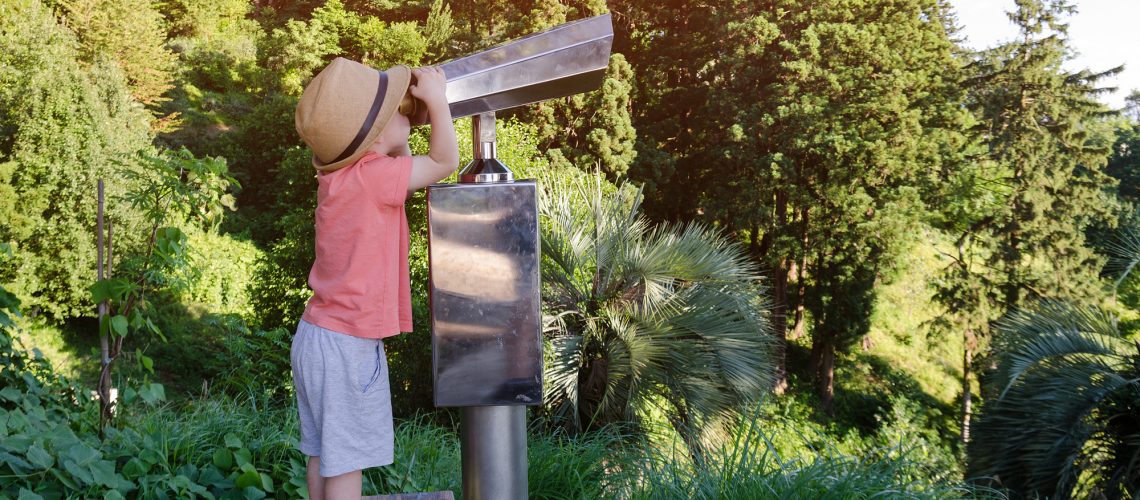When we hear the word “zoom,” these days, the online video conferencing platform, made necessary by Covid-19, comes to mind. Everyone from young to old seems to have zoom accounts. I wonder though, as the Zoom platform allows us to zoom in on colleagues, classmates, friends and family, does it keep us from healthily zooming out? Does it prevent us from going outside, developing new skills, crafting, reading, playing, figuring out how to socialize safely in the presence of others and even resting our eyes? If we don’t toggle between zooming in and zooming out, we may find ourselves feeling trapped, exhausted and overwhelmed. Changing perspective based on the issue in front of us is necessary to address stress and other challenges typical for the gifted and twice exceptional communities. ‘Telescoping,’ the act of zooming in and zooming out, is necessary to shift perspective and persevere.
As my grandmother used to say, “Everything in moderation.” People, and in particular, gifted and twice exceptional people, need to know when to ‘telescope’ in order to regulate stress. As parents of gifted and twice exceptional children navigate the ever-changing landscape of Covid-19 classrooms (and the lack thereof), they become anxious. Their own 2e-ness which may include, perfectionism, anxiety, and executive functioning challenges, make it hard for them to gain perspective. Perhaps they are zooming in too much.
When parents contemplate each and every situation they need to organize; addressing their children’s care and education, managing their own work life balance, perhaps nurturing relationships, and ensuring the health and safety of their loved ones, it becomes all-consuming. Focusing on every detail overwhelms us and we get stuck. When we hyper focus inward, it’s time to zoom out and broaden the perspective. To zoom out, we can consider what we are grateful for and where we are successful.
Some parents worry about their children’s school experience. Sometimes they fear that their child has fallen behind or will have gaps in learning. Sometimes they worry that because they enriched and supplemented their child’s education during distance learning, that their child will be bored in the coming schoolyear. They focus on every detail and feel buried in questions and decisions. My suggestion in this case is to widen the perspective – essentially to “zoom out.” Consider the big picture. Everyone, EVERYONE is going through this right now. Not just your school, town, state or even country, but the ENTIRE PLANET is struggling with education (and many other issues). Sometimes realizing others are similarly situated and that we are not alone, helps temper the intensity of fears and uncertainties.
However, when we are overwhelmed by the big picture, it’s time to focus in, maybe even to compartmentalize and address one thing at a time. For instance, parents may zoom in to take a careful look at priorities and what specific messages might help teachers and school understand and meet their children’s needs. Similarly, when parents share with me that their child refuses to do certain things, we zoom in. We don’t make an overall conclusion as to what the child can or should do. We look at each day or each part of the day – morning, afternoon, evening – to determine what must get done. We go task by task. Once we create our list and start to move through it one item at a time, we can zoom out and look for the child’s progress. We can celebrate instances of growth and development. Zooming in and zooming out gives us both the perspective to focus on priorities and notice progression.
The same goes for education in general. On the one hand we don’t want to become demoralized by things we cannot control – the big picture questions of how and when. On the other hand, we must understand that education is turned upside down everywhere. In order to express empathy and afford educators a benefit of the doubt, we hone in on and recognize that teachers are fearful, frustrated, and struggle to balance their own work and homelife.
For 2e adults who are not parents, telescoping is just as necessary. During social distancing introverts may find relief from selective interactions and imposed sensory avoidance. They may find themselves happily ensconced in projects, working from home via video conferencing and are able to control sensory input. However, they may struggle with this intense inward focus and need to broaden their perspective. Some introverts without the expected or necessary socializing, find themselves ill-equipped in how to make connections. It was hard enough to find a “tribe” before, now it feels next to impossible. They may find themselves even more lonely then before and need to widen their circle.
For extroverted 2e adults during this time, they may find themselves longing for connection, for touch, for in-person interaction. Yet, some extroverts have become uber creative at making connections and are enjoying the time they have to cultivate these connections. Believe it or not, the cottage industry of professional cuddlers (see, https://cuddlist.com/) – which I believe began because of technology-induced loneliness – now offers “virtual cuddling!” Some extroverts enjoying the plethora of opportunities to virtually connect, may need to narrow their focus to address their specific interpersonal needs.
Gifted and twice exceptional people tend to have deep empathy and concern for global issues. With the “three Ps” – Pandemic, Protests and Politics – if we don’t telescope we will quickly become demoralized. With the plethora of BIG questions currently looming, it is necessary to zoom in and focus on one thing at a time, on what we can do and how we can support those suffering. Think about what you can do at this moment. Focus on that, if possible, make a short to do list and protect yourself from the buzz of all the other concerns around you. As they say, “you have to start somewhere.”
I am not advocating that we ignore or forget about the important societal upheaval all around us but do give yourself permission to focus on one thing at a time. Reserve space and time to educate yourself and to find something specific you can do to address the turmoil. Educate and involve yourself and your children at an appropriate level and encourage involvement. From placing a sign on your lawn to writing a politician, to attending an online seminar regarding the issues, to donating, if you focus on education and involvement hopefully you will feel as though you accomplished something.
Undulating between the big and little picture is a skill that allows us to manage and modulate anxiety and overwhelm. This strategy works for tackling writing assignments, chores and even approaching world challenges. There are times when crisp clear focus on what’s in front of you helps to create inspiration to get things done. But there are times when pulling back, getting a broader scope, allows us to adjust our expectations, relax and move forward. Just knowing that we have this strategy within our grasp gives the peace of mind necessary to remain calm and persevere.

Author: Julie F. Skolnick M.A., J.D.
Julie Skolnick, M.A., J.D., is the Founder of With Understanding Comes Calm, LLC, through which she passionately guides parents of gifted and distractible children, mentors 2e adults, and collaborates with and advises educators and professionals on bringing out the best and raising self-confidence in their students and clients.

